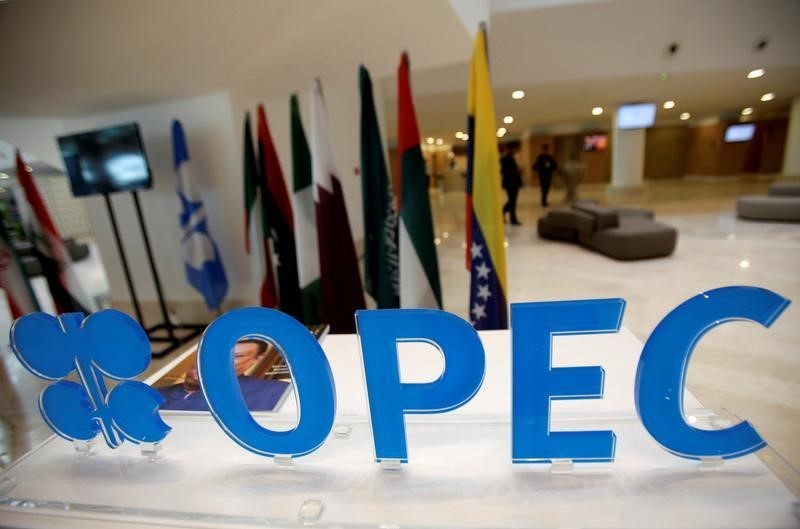By Olesya Astakhova and Shadia Nasralla
VIENNA (Reuters) - Saudi Arabia is seeking to persuade Russia on Wednesday to cut oil production substantially with OPEC next year in an attempt to arrest a decline in the price of crude and prevent another global glut.
OPEC meets on Thursday in Vienna, followed by talks with allies such as Russia on Friday. The producer group's de facto leader, Saudi Arabia, has indicated a need for steep reductions in output from January but has come under pressure from U.S. President Donald Trump to push oil prices even lower.
Russian Energy Minister Alexander Novak was due to meet his Saudi counterpart Khalid al-Falih on Wednesday.
Saudi Arabia has indicated it wants the Organization of the Petroleum Exporting Countries and its allies to cut output by at least 1.3 million barrels per day, or 1.3 percent of global production.
Riyadh wants Moscow to contribute at least 250,000-300,000 bpd to the cut but Russia insists the amount should be only half of that, OPEC and non-OPEC sources said.
Graphic: Who might agree to an OPEC crude supply deal? https://tmsnrt.rs/2Ru61od
"It is not easy but we will always work together with our colleagues," United Arab Emirates Energy Minister Suhail bin Mohammed al-Mazroui told reporters in Vienna when asked about Russia's position.
A source close to the Russian Energy Ministry said: "No one is eager to cut unless there is an emergency. It is the United States where we are seeing the bulk of the increase in oil output. OPEC and Russia will be very careful about voluntary 'blood letting'."
Graphic: OPEC's battle to coax Russia to cut oil output as the US ramps up - https://tmsnrt.rs/2RzCE3J
Graphic: Difference in OPEC oil output between Nov 2018 and Oct 2016 - https://tmsnrt.rs/2RqgBMS
Russia, Saudi Arabia and the United States have been vying for the position of top crude producer in recent years. The United States is not part of any output-limiting initiative due to its strict anti-trust legislation and fragmented oil industry.
Graphic: OPEC crude production in November - Reuters Survey - https://tmsnrt.rs/2RqgctQ
TRUMP RAISES PRESSURE
Oil prices (LCOc1) have fallen by almost a third since October to below $60 per barrel after Saudi Arabia raised production to compensate for a drop in Iranian oil exports due to fresh U.S. sanctions.
Washington also gave sanctions waivers to some buyers of Iranian crude, further raising fears of an oil glut next year.
Possibly complicating any OPEC decision is the crisis around the killing of journalist Jamal Khashoggi at the Saudi consulate in Istanbul in October. Trump has backed Saudi Crown Prince Mohammed bin Salman despite calls from many U.S. politicians to impose stiff sanctions on Riyadh.
"How can the Saudis cut substantially if Trump doesn’t want a big cut?" said Gary Ross, chief executive of U.S.-based Black Gold Investors and a veteran OPEC watcher.
"Trump is worried about the Fed and inflation. So he wants low prices now. Also if Saudis are obnoxious with a deep output cut, it will spur the Democrats in Congress to go more actively for the Nopec legislation and the withdrawal of U.S. support for the Saudi-backed forces in the war in Yemen," Ross said.
The Nopec legislation being discussed by U.S. lawmakers could make it possible to sue Saudi Arabia and other OPEC members for price fixing.
Bob McNally, president of U.S.-based Rapidan Energy Group, said OPEC was stuck between a rock and a hard place given pressure from Trump on one hand and the need for higher revenues on the other.

"We think OPEC will try to come up with a fuzzy production cut ... It won’t be called a cut but will effectively mean a cut, which will also be difficult to quantify," McNally said.
